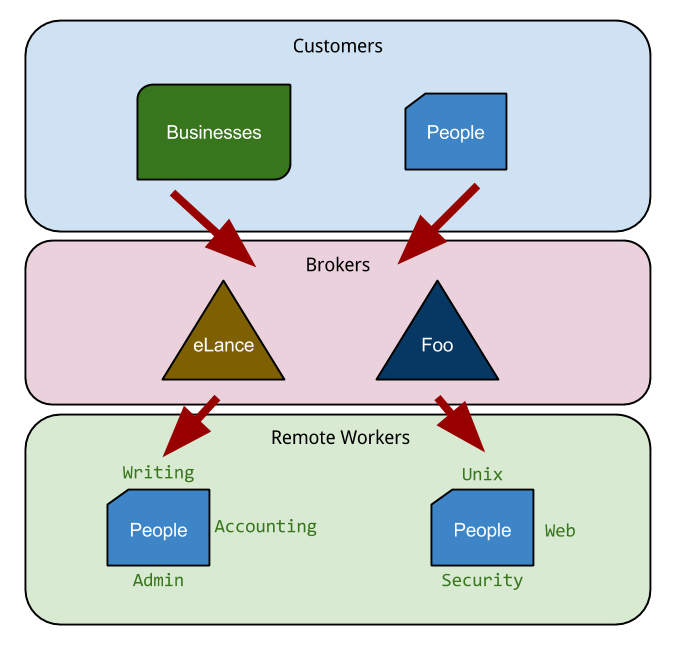The Future of Work

The job economy is about to get Ubered >.
If you’re not familiar with Uber, it’s a transportation company that is disrupting (displacing) the taxi cab market. Instead of calling a cab company, getting treated rudely, and then maybe getting a cab, you use your mobile phone to request a ride.
You don’t have to talk to anyone. The app knows where you are, and it sends a drive right away. Oh, and payment is handled transparently, so you just get out when you get there.
But it’s not just cab companies that are being bypassed. This same "direct service model" is spreading to countless industries.
eLance (connecting requestors and providers)
Bugcrowd (getting individuals to test for security)
uTest (getting indviduals to test for many things)
And we’re seeing the taxi bypass model coming to multiple industries. Techcrunch is full of new services that take the provider directly to the user, e.g.:
Massage
Manicure / Pedicure
Tailoring
Cleaning
Food delivery
And soon it’s also going to be how employers and workers find each other. It’s going to replace traditional hiring.
Here’s how it’s going to work:
Working for a company will become less necessary and less common. It’ll be too expensive for them and too restrictive for the workers.
Instead, people will simply have skills, and they will advertise those skills on an open exchange (brokers in the graphic above).
People, and their various skills, will be rated in multiple ways. The amount of training you have in them, the work you’ve done, and the ratings you received on that work.
Ratings will be two-way—just like on Uber—so the worker will rate the job and the boss/manager in addition to them being rated by them.
One’s scores will become crucial metrics for them in the career marketplace. They will be an indicator of how much you should be trusted, the quality of your work, how easy it is to get along with you, and what skills you’re good at.
Companies like LinkedIn will be the platform that recruiters (changed, but still present) will use to connect people to people, and businesses to people. But the better the software gets, the less those people will be needed.
People with good ratings will have little trouble getting work in their field. High ratings and choice recommendations become one’s capital.
We can already see signs of this happening. LinkedIn has a skills rating system where your peers vouch for your competence in a given area. Your skill set is listed clearly, with a weight in each area according to how many people said you were good at it.
eBay (and now Uber) have another piece of it—the rating of interactions. Each side gives a rating and leaves notes on how they liked doing business with the other. It’s a powerful way to shape behavior, as people don’t want to get a bad rating and start getting passed up for jobs.
The algorithms are key
The brokers in this scenario are quite powerful. They run the platforms that people use to rate others. To select them. To deem them unfit to be presented as an option within the system.
Those who control these rating systems, and the connecting of customers to service providers, will wield considerable influence.
In short, the power will shift away from the centralized companies that hire individuals to do work internally, and more towards the people needing the work done, the individuals that do the work, and the brokers who facilitate through smart connection and filtering algorithms.
The disruptive power of this model lies in it’s flatness. People submit their skills, rated by a trusted party, and it doesn’t matter much where they’re from. They can be from San Jose or Prague—as long as they can communicate it’s all the same to the purchaser.
The game changes from local companies with isolated pools of limited resources to a global pool of people with their skills and quality clearly advertised.
Sharpen your abilities, and prepare to put yourself out there. This is the future of work.